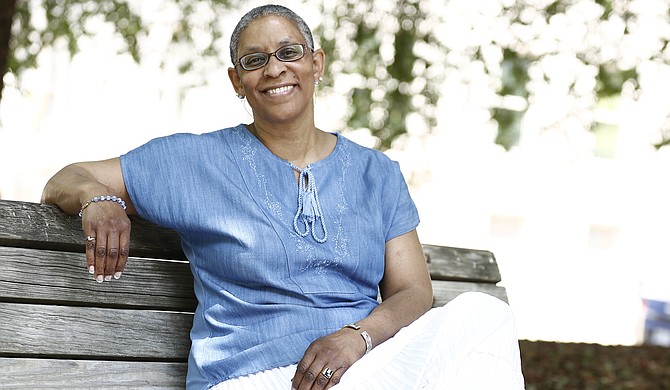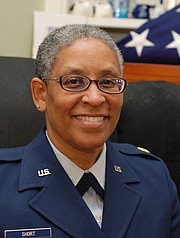Dr. Valerie Short is one of two Democratic women running for Mississippi governor. Photo by Imani Khayyam.
In keeping with the spirit of the U.S. Air Force's motto "Aim High" Dr. Valerie Adream Smartt Short has set her sights on the state's highest office.
In doing so, Short joined Madison-based attorney Vicki Slater, also a Democrat, as the first women to run viable campaigns for governor of Mississippi since Evelyn Gandy more than three decades ago.
When Short announced her candidacy for the Democratic nomination for governor, she said the political leadership in Jackson is only interested in scoring points against President Barack Obama.
Whereas some Democrats are reluctant to embrace Obama and the success of the health-care overhaul won in his early days, Short is making Medicaid expansion and increasing health-care access, along with education, the centerpieces of her policy and economic-development agendas.
Short is the oldest of seven U.S. Air Force brats. Her father served in the Air Force for 20 years, including during the Vietnam War.
The family lived in six states and three countries overseas-—Spain, Germany, and Moshi and Morogoro, Tanzania, where she graduated from high school and junior college, respectively. After completing her bachelor's degree at Vanderbilt Un iversity, she joined the Air Force to pay her way through medical school at Vandy, where she received her M.D. in 1985.
An OB-GYN, she lives in Ridgeland, is divorced and has one daughter, Naomi Short, and a granddaughter, Kylie.
Dr. Short recently talked to the Jackson Free Press about her desire to become Mississippi's health-care governor.
Based on your press releases, you're all about Medicaid expansion and health-care access. Some states have done the bare minimum; others have opened eligibility up more widely. What does that expansion in Mississippi look like to you?
Luckily, in our nation there's a diversity of approaches. Unfortunately, in our state we haven't tried anything, and so for me it looks like starting at ground (level) one. I want to expand Medicaid. Because it's important to me that patients who want to see me, or who have tried to see their physician, have no access. That's a problem. And then access to quality is a problem.
I've worked in a variety of different venues in the medical field as well as in the public-health field and I've had patients tell me that they are in the left-out group who have no insurance access. They are not happy about that.
Are people are going to the emergency room or just not going to the doctor at all?
A bit of both. Again, it's a very multifactorial problem. There are some people who delay going to the doctor, whether it's an emergency room or a clinic, until they absolutely have to. That's the most common approach that I find.
Not only that but people are made to feel ashamed that they have a lack of access. The third thing is that health-care bills take a big chunk out of whatever income they might have.
One argument against Medicaid expansion is that you expand eligibility and 300,000 more people are eligible. Now, there's a run on the ER and doctor's offices, and the system may not be equipped to handle that.
I think we have history to look to that could help us out. I'm sure that these programs, when they first came into being, we had the same fears about the programs. So fast forward to the 21st century, there are going to be some people who still have some of those fears. The initial fear was that the people who were already eligible for Medicaid would (enroll) to avoid the (tax) penalty. So we have a lot of work to do in order to make our state healthier and come off our health-care grades of F.
Giving people access to health care is one thing. Getting people to go to the doctor is another. How would you educate people on the importance of preventive care and healthy lifestyle choices?
What I do now is continuum of care, a continuum of education, a continuum of advocacy, a continuum of awareness. That will never go away, which is why those of us who are in health will always have a job.
I guess my question is whether we have the capacity to handle a rapid expansion. Do we have enough doctors, particularly in less dense parts of the state like the Delta?
Medicaid expansion is about the dollars. ... With anything, you will have to start where you are, starting with your highest-priority needs, and you will rank what needs to be done. So priority No. 1 is funding. We need to look at how we can take advantage of the dollars that will then in turn assist us in further developing our health-care workforce and expand services to patients no matter where they're located. Even in the Jackson Metropolitan Statistical Area, there are pockets of ruralness. It's not so technically different in terms of the need.
How much are you willing to compromise on the kind of expansion you want to see and what the Legislature is willing to allow?
Practicing medicine and public health is all about negotiating, relationship building, partnering, meeting people where they are and building alliances.
There has been talk of doing things that are not Medicaid expansion as allowed by President Barack Obama's Affordable Care Act: reinstating disproportionate-share payments, lump-sum appropriations to hospitals, the creation of health-care zones. Are you open to talking about those things?
When we talk about expanding health-care access, we're also talking about hospitals. In fact, our hospitals are closing because they have lost their funding and (have been) underfunded by the state and selectively funded across the state.
So that's (the Mississippi Legislature's) approach. That's not my approach.
Is the Legislature's approach the wrong approach in your estimation?
I just have a different what of looking at it than they do.
What are your thoughts on the 2013 abortion clinic admitting privileges law? I ask because of your background as a physician and OB/GYN and because the state has devoted a lot of resources to legal fights over the law. Should the state continue fighting on behalf of the law?
Actually, abortion is not our biggest state issue when it comes to health. One of the good things is we already have a low rate of abortion in our state. We have other, bigger issues to deal with when it comes to health care that does not include the polarization that we have when it come to addressing the abortion rate. So if our individuals who are polarized on the issue of abortion would also use that same passion toward the other health-care issues that are a big problem in our state, I think that would help to move our state forward.
At the same time, Mississippi's teen birth rate is one of the highest if not the highest in the country, and contributes to a lot of other problems such as poverty ...
Once again, there are multi-factorial and very diverse reasons for the outcomes that we have. So we have a high infant-mortality rate, we have a high neonatal-mortality rate, we have a high maternal-mortality rate. In fact, our rates are increasing and those rates are high not necessarily because of our teen birth rate. In fact, (even though) our teen birth rate is one highest in the country it is around the age of upper-level teens not the younger teens.
The governor is opposed to abortion. Do you identify as pro-life, pro-choice or ...
I identify as pro-woman.
Health care is also part of your economic program. How would you make sure that the state got the most bang for its buck with health-care expansion?
The part of the dollars that come from Medicaid expansion would allow us to invest in our hospitals, which will then in turn allow us to improve our numbers in the workforce. This in turns feeds into the success and growth in our economy by having healthier citizens who can then participate in the health-care workforce and be healthy and not miss days because of lack of wellness. All of those things will play into productivity, job growth and improvement of the economy. Our Medicaid dollars that we will get will allow families to grow and spend their money elsewhere. For instance, in helping with the education for their children in junior colleges and college. When those children come out, then they will also be able to participate in the economy. Those are not the only parts of the economy, but they are part of the pillars of the economic growth.
A big focus of this governor has been manufacturing. Would you continue it?
The industries in Mississippi that help to form our economy include manufacturing and construction as well as health care, education and service jobs. So it will take a variety of industry to help keep our economy sustainable. It's better to have a diverse economy than to only focus on one part of the economy, which will stunt our economy. And right now our growth rate is zero. And some of those reasons could be why we're sitting at a growth rate of zero.
These manufacturing projects have depended heavily on tax incentives—tax breaks if you want to call them that—do you have philosophical views on how those have been applied?
Not today. We might have to revisit that issue at a later date.
What other industries are prime for development?
Let's put it this way—there are no industries that I think are not (prime for development).
How do you stop brain drain, stop young people from leaving Mississippi and get people who have left to come back?
Number one, you make changes for the better that allows them to feel attracted to Mississippi. Again, improving health care and improving education in our state will attract other persons and professionals to our state and allow our best to remain in Mississippi because they will have the economic options available right here in our state and they will not have to go anywhere else.
Also, if they do choose to leave and seek a degree, an internship or an apprenticeship elsewhere, they will not feel that they cannot bring that expertise and contribute to the sustainability of Mississippi.
Right now, we lose a lot of students who leave and don't come back until their family members need their help later in life. We have to show that we want to attract and retain all of our Mississippians. And we must be diverse and have that economic opportunity available.
In one of your releases, you criticize the governor on equal pay, but he hasn't had an opportunity to sign a bill. Is that fair? And, second, what would you do to get an equal-pay on your desk to sign?
In terms of criticizing the governor, he has his alliances with members of the Legislature, which does not favor the bill and, therefore, the bill does not make it to the governor's desk. If the governor showed a more positive approach to the bill making it to his desk, it would then mean he would be making alliances, working across the party lines so that he could guarantee that the bill would make it to his desk.
The governor and Legislature have filled up the rainy-day fund in the past few years. Is there anything we should be throwing more money at?
Health care and education - those are the most urgent priorities with families across Mississippi. Everywhere I go, those are the two issues that I hear as the most needing to see change (from) the current approaches to those issues.
Certainly, families are concerned about the education of their kids across our state as well as the education that they get leading them to what type of economic opportunities, jobs and careers that will be available to them, as well as will they be able to pursue their dreams that will add to the dream of Mississippi.
Do you think we can afford to fund the Mississippi Adequate Education Program?
Sure. You put your money where your treasures are. We have monies available that we can use. We also have monies available through Medicaid expansion to increase economic (development) in our state. We have money that we can take advantage of that we have not utilized in the past. The current governor and Legislature fails to take advantage of the dollars that can go to improving the quality of life and well being of Mississippi residents.
What are you going to do for Jackson?
Jackson is part of our state. In other words, when I talk about Mississippi I talk about it as a whole. One, Jackson is the capital of our state so what I do for the state will also be done for Jackson. No. 2, I already have alliances built here even more than I have across the rest of the state. Whether it's in central Mississippi, the Pine Belt, up in the Delta, whether I'm down on the coast at Keesler (Air Force Base), whether I'm in Scott County, the same care and concern I've given over the past 22 years in Mississippi would be the same continuity of care I would be giving as governor.
There's feeling in Jackson City Hall that the Legislature could be doing more for Jackson, that the capital has been ignored and needs more attention.
What it sounds like to me you're saying is that we need a new governor.
The mayor of Jackson recently declared a state of emergency for infrastructure, which could be helped with a declaration from the governor. Would you issue a state of emergency in this situation?
When I become governor, I will use my relationships with the current mayors and current city councilmen and the current legislators in the central Mississippi area. We will build our relations and we will produce what we think (is best) as stakeholders interested in the continuation sustainability and survivability of Jackson.
You don't strike me as a rabid partisan.
That's your perception. That's a choice you get to make. But you are limiting yourself in your perception, and what little you know ... and to know truly what it has taken to become who I am. Part of what campaigning is about is to promote what I have been able to bring to Mississippi thus far as well as to promote what I'm passionate about and the impact I'd like to make.
But in terms of leadership styles, you have some pretty heavy-handed guys in Lt. Gov. Tate Reeves and Speaker Philip Gunn ...
Are you suggesting that as a woman, I won't be able to ...
I'm asking how would you describe your leadership style-—are you hands on, are you a delegator?
I think there is a need for having diverse skills, and you would use the skills and the tools you have depending on the situation you're faced with. So it's not my best advantage to limit the skills that I have in my toolbox. Each situation will require a different set of skills.
What we see now is one skill set used across every issue. It has not held us very well to this point. Obstruction does not work very well.
Finally, why are you running for governor?
I'm a Mississippi mother, Mississippi grandmother and Mississippi businesswoman. I've practiced both acute care as well as preventive public-health care across our state. I'm an obstetrician-gynecologist so I've delivered many babies across our state. I've delivered enough babies where I can tell you that they are in the voting age range at this point. I'm looking forward to them voting.
The reason I mention it is because I'm looking for a continuity of care—delivering a healthy baby, keeping a healthy mom, looking for a continued healthy outcomes. I'm a health educator and a health advocate along with being a veteran, serving in the United States Air Force for over 10 years, as well as being an air-force brat and the oldest of seven children. So I have experience and leadership that is not typical as well as the desire to serve my state and courage to serve.
Read more interviews at jfp.ms/2015elections/.
Dr. Valerie Adream Smartt Short
Age: 56
Residence: Ridgeland
Experience: U.S. Air Force, 1982-1992, (honorable discharge); board-certified obstetrician-gynecologist and independent medical consultant
Education: Bachelor of Arts, Vanderbilt University, 1981; Doctor of Medicine, Vanderbilt University Medical School, 1985
Family: Divorced; Daughter, Naomi Short; Granddaughter, Kylie






Comments
Use the comment form below to begin a discussion about this content.